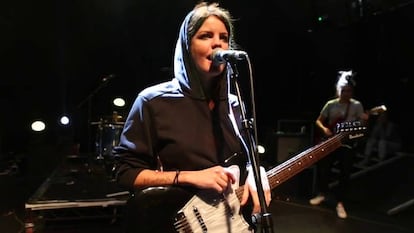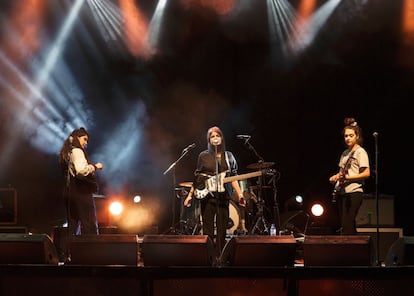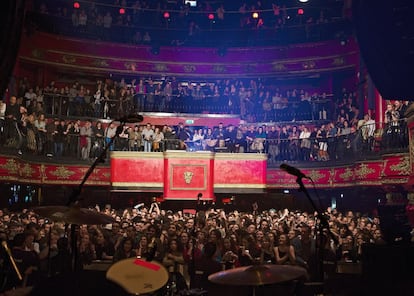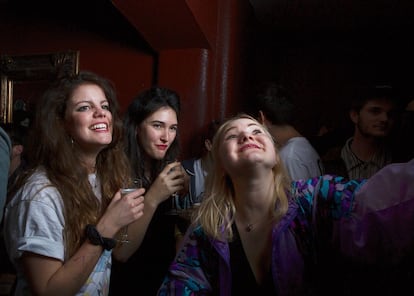Hinds: How four Spanish girls in London made the leap to global fame
The garage band is wowing British and US critics

Two young women are walking down Camden High Street on a chilly February morning, headed to a former music hall that under various guises – Camden Palace, Music Machine and now Koko – has hosted concerts by The Rolling Stones, AC/DC, The Clash, Madonna, Prince, and Oasis. When the pair reach the venue, before entering, they decide to smoke a cigarette. The other half of the group are still “chilling” they say, their voices raw, their eyes red, and their hair unwashed. They admit that last night, once again, things got out of hand.
Tonight, London hosts Hinds, made up of Carlotta Cosials, Amber Grimbergen, Ana Perrote and Ade Martin, all aged between 19 and 24
They’ve come “straight” from a party. The annual NME Awards, at which they were nominees for Best New Band. They didn't win, but they certainly had a good time. A chilly breeze sweeps down from Camden High Street and they quickly stub out their cigarettes before heading into Koko. As their eyes get used to the darkness, they stand in the vast empty hall staring up to the high ceiling, at the empty stage, around at the balconies. The two young women drop their suitcases as though they were in a cathedral. “Take a look at this. Fuck.”
The venue, which holds 1,200 people, is sold out. Tonight, London hosts Hinds, made up of Carlotta Cosials, Amber Grimbergen, Ana Perrote and Ade Martin, all aged between 19 and 24, and who, since performing for the first time in Madrid in 2014, have played around the world, releasing their first album in January. In the meantime, they have earned glowing praise in the music press and acclaim from any number of veteran musicians.

The four begin their sound check: Amber on drums, Ana and Carlotta on guitar, and Ade on bass. “Fuzzy garage pop” is how Pitchfork describes their sound. They begin to crank out power chords, working on their harmonies, dancing around the stage. Last night they played in Nottingham, in two days they’ll be in Manchester, and then on to the United States, Australia and Japan.
But right now what they really want to do is take a shower: there’s no hot water in the hotel they’re staying at. The sound check over, they head backstage where they are able at last to wash and change their clothes. Eventually, Nick Holroyd, their booking agent, turns up, showing off his new tattoo: a hind. Friends from Madrid and Berlin arrive, along with a couple of bottles of Moët & Chandon, courtesy of the promoter. Ade slumps down on the leather sofa: “I feel terrible…” Amber is struggling to open her suitcase. Carlotta emerges from the shower with her wet hair wrapped in a towel. They ask each other what they should wear, as well as what to drink: “A Red Bull? Another beer would be better!”
The four were already friends before they formed Hinds, hanging out in Madrid’s grungy Malasaña neighborhood
The four were already friends before they formed Hinds, hanging out in Madrid’s grungy Malasaña neighborhood. Carlotta Cosials, the eldest, had dropped out of medical school to study dramatic arts. She met Ana in 2009. In 2011 they spent the summer at the beach playing guitar, even giving a couple of concerts, but they never took things further. They are the nucleus of Hinds. Ana, aged 21, was studying advertising and PR, but parked it when things took off. “There was no time to choose: this life chose us,” she explains.
Events unfolded very quickly. In 2013 the pair decided to try out as a duo. They chose the name Deers, which they had to change to Hinds last year. They wrote their songs in English. By now they had met Adelaida Martín, aged 23. She had started studying architecture, but realized there was no future in it after the property bubble burst in 2008. She started playing guitar two years ago.
“We felt we could do anything we set our minds to”, says Carlotta. So she and Ana recorded a video of their song Trippy Gum, which they sent to the Make Noise Malasaña battle of the bands. They made it through to the finals and were given two months free rehearsal studio time. The pair realized they needed a bigger sound, and so invited Ade to take up the bass, and then found Amber among their Facebook fans. She was then aged 17, but had studied music and could play several instruments, among them drums.
Ana and Carlotta had recorded a couple of songs on their first day in the rehearsal studio, posting them on the internet. They then contacted Joan Vich, one of the organizers of the Benicàssim Festival. “I listened to them a couple of times because they were friends,” she says. “Then I put the songs on again. And when I realized that I had been listening all morning, I contacted them.”
The next day, British music magazine DIY recommended the songs, describing them as “three-chord punk.” The next day, music blog Line of Best Fit was singing their praises. Editor Paul Bridgewater, also at the Koko gig, remembers his first impression: “It was one of those things… There are two or three songs like this every year. Ten percent of a new song is potential. And that 10 percent was their rhythm, their ‘I don't give a shit.’ You could see into their lives, they transmitted friendliness. Trust. They weren’t trying to do something beyond their reach.” Within two days of putting out two songs, they received an email from music magazine NME. The big bang had begun. And while the universe expanded, they played their first gig as a quartet in the final of Make Noise. They won. There were a few English ears in the audience, among them Stephen Richards, the owner of independent record label Lucky Number, where Hinds had just recorded their first LP, Leave Me Alone. The emails kept coming in, and so Vich, who by now was their manager, decided to set up a gig in London at the Sebright Arms, a well-known music venue in the capital’s Bethnal Green neighborhood.
Carlotta: “I could hardly talk I was so nervous. The media was there, booking agents, record labels…”
Ana: “There must have been 30 of our fans, everybody else was from here. A new band and they haven’t been signed yet. They’re virgins. They were falling over each other to get us.”

Ade: “We were like, fresh meat.”
Ana: “The next day, Joan said her email inbox was on fire.”
Two years later, The Guardian gave the group a five-star review: “a riotous rush of girl-gang energy.” NY Mag: “It's a messy, fun album that you won't be able to get through without wanting to grab a can of Budweiser and go hang out in a basement somewhere.” Simon Vozick-Levinson, senior editor at Rolling Stone magazine: “Their shows are ridiculously fun garage-rock rave-ups – much like their debut LP, Leave Me Alone – and lately the crowds have been wilder than ever…” Even Primal Scream’s Bobbie Gillespie recommended them to his 230,000 Facebook friends, saying: “They sound best live, with out-of-tune guitars. Innocence and Dissonance.”
A line is forming outside Koko. At the head of it is Rosie, a 21-year-old from London. This is her fifth Hinds concert. She saw them at the Sebright Arms. “They converted me. They’re really funny on stage.” Frankie, next to her, is 17: “They’re really cool. I love how they dress.” The doors open and the fans rush to the front of the stage. By now, the beers have run out in the dressing room but more have been ordered in. More friends arrive. Vich discusses new tour dates. Carlotta sits down and starts to talk about something that clearly bothers her. Back home in Spain, the reviews have been less than enthusiastic, with some critics describing the band’s live performances as “a high-school graduation party.” Carlotta says that Spaniards are more cautious about new things: “They seem to reject it.”
Ana and Carlotta say they began writing their songs in English because that’s how they came out
Ana and Carlotta say they began writing their songs in English because that’s how they came out (they certainly wouldn't think about writing in Spanish now). Their songs “are about love; we’re friends, that’s what we talk about.” When they compose, they ask each other how they feel, they form a “cloud,” and then put it down on paper. But only in English, for example: I need you to feel like a man when I give you all I am / I know you’re not hungover today you’re classifying your cassettes.
It’s almost showtime. Ana asks Carlotta: “How do you feel?” She replies: “Strange”. They look into the mirror. Red lips, black eyes. Jeans and t-shirts. Earrings. They look again. They let their hair down. They have 31,000 Instagram followers. They record themselves on video. Sergio Alberto, a photographer they met at Make Noise and who’s in London today, asks if he can take a snap. They pose. “Awesome,” he tells them, adding: “They really connect with people, it’s amazing. They are so good on stage. They’re only 20 years old, they’re happy and that’s why they sing.” With five minutes to go before they take the stage, they start to sing. Carlotta shouts, “Yes!” and launches into Saradonga. Then she realizes what they really need is Mark Ronson’s Uptown Funk. They start to dance and sing along with the chorus: “Girls hit your hallelujah!” and with this they head out to the stage. A voice from somewhere says: “They’re crazy.”
The stage is dark. They wait on the side. The lights come on and the crowd roars. The four head out. For a moment they freeze, faced with more than a thousand pairs of eyes. They haven’t seen anything like it. A voice shouts out from the audience: “Ana, guapa!” They pick up their instruments. Ana strums the chords to Warning With Curling, the number they open all their gigs with. The drums come in, then Ade’s bass. The crowd starts jumping, while 12 photographers try to elbow themselves some room.
When the first number comes to an end, they look at each other, beaming. This is their ninth concert in London, the biggest so far. They kick off again, and their happy, lo-fi sound infects the audience. Down in the crowd, people are pogoing, two girls are dancing their version of a Tarantino movie, there’s a Chinese kid bouncing around, a woman on somebody’s shoulders recording the whole thing, a couple pouring beer down their necks, somebody being carried aloft the crowd, Brits shouting in Spanish, young people, under-25s, beards, hats, wine-colored lips, messy hair; and then a chorus of British-accented “Outra, outra...” when Hinds leave the stage after dancing with 20 fans and announcing that the party will continue at The Lexington, a stone’s throw away in Pentonville Road. The quartet climb down into the audience to sign photos and hand out plectrums and drum sticks.
Back in the dressing room, things are getting messy, and the wine, gin and tequila is flowing
Back in the dressing room, things are getting messy, and the wine, gin and tequila is flowing. Lucky Number’s Stephen Richards is opening a bottle of champagne. “Toast,” he shouts. Dylan is playing on the speakers. Everybody is smoking. The pizzas arrive. Spanish and English are spoken. Richards says that the whole thing has been “organic” – growing, always growing, always packing the audiences in. The group has sold 9,000 records in the UK, along with 7,000 in the US, where they have been topping the university radio charts for weeks. They’re due to play the legendary Bowery Ballroom in New York, and then Stephen Colbert’s Late Show. That’s going to be a big leap, says Richards. He insists the band’s success is due to their lyrics. “They sound like strange poems,” he says.
Everybody heads off to The Lexington, where Hinds are spinning the discs. First up is Britney Spears. One fan, after nine gigs, says there is something “infectious” about Hinds. Another says that their lyrics sound “sexy” to English ears, and then asks for a selfie with Carlotta. By now it’s 2.30am. The place is packed. AC/DC’s Thunderstruck comes on.
The next day, when they turn up at their record label, they are still trying to piece together the events of the last night. Twelve people ended up sleeping in their room, and one of Ana’s earrings is now encrusted in her ear. Things got out of hand, by all accounts. Bedraggled and unwashed, they spend the day traipsing from interview to photo session: The Independent, Evening Standard, Q Magazine… They order coffee after coffee. This is the b-side of being a rock star: hangovers, a filthy van with a table piled high with empty beer cans, sticky with coffee, orange juice and instant noodles. The tour manager drives. Amber puts some music on. The others remember recording their first tracks back in Madrid. “We were rock soldiers.” Since then, they’ve played 183 concerts. Outside, row upon row of redbrick houses pass by. Not long ago, when they were here, they would sleep on friends’ floors. This is what they’ve done all over the world. They would stay wherever they could: “Even in our fans’ places.”
Ade says that at recent photo sessions they’ve been done up like “perfume adverts”. She says she wants to be seen as a musician, a rocker. That night, they return exhausted to their hotel in Camden Town. They head to their favorite Chinese restaurant, order food, and Carlotta paints a time line on the paper table cloth of the years that have changed their lives. They all gave up on their studies in 2014. Their manager talked to their parents. Even if things didn't work out, it would have been a fantastic experience. Some journalists have suggested that they’ve had an easy time of it. “Easy? That’s bullshit,” says Cosials. “If there’s one thing they can’t say, it’s that we’re lazy. We find that very offensive. Listen, we’ve made a lot of sacrifices. Sure, we love what we do, and you’ll always see us with a smile on our faces. But that doesn't take away the hours of sweat, tears, money, mental effort, and creativity that we’ve poured into this.”

They’ve always written their own material. They created their own videos and merchandising. They make their own decisions. They get advice, obviously, but nobody interferes with their music, with their image. “What is the secret of Hinds?” says Cosials. “I think that the people we work with think, ‘I don’t know what the group has, but I like it.’ And they don't want to stage-manage it in case they spoil it: it would lose its authenticity, and then you’ve fucked it up.” Ana gives an example. Their next video. This time, they won’t be directing it. They describe the current concept as “shit”: “Girls in makeup, with heels and pearls, spilling champagne.” They’ve agreed to talk with a director via Skype. Over the leftovers from their meal, they connect by smartphone with Los Angeles: some guy with a beard. He asks what they would like to do in the video. “Jump out of an airplane,” replies Ana. “The sea,” says another, and then they all chorus: “But no swimsuits!”
Tu suscripción se está usando en otro dispositivo
¿Quieres añadir otro usuario a tu suscripción?
Si continúas leyendo en este dispositivo, no se podrá leer en el otro.
FlechaTu suscripción se está usando en otro dispositivo y solo puedes acceder a EL PAÍS desde un dispositivo a la vez.
Si quieres compartir tu cuenta, cambia tu suscripción a la modalidad Premium, así podrás añadir otro usuario. Cada uno accederá con su propia cuenta de email, lo que os permitirá personalizar vuestra experiencia en EL PAÍS.
¿Tienes una suscripción de empresa? Accede aquí para contratar más cuentas.
En el caso de no saber quién está usando tu cuenta, te recomendamos cambiar tu contraseña aquí.
Si decides continuar compartiendo tu cuenta, este mensaje se mostrará en tu dispositivo y en el de la otra persona que está usando tu cuenta de forma indefinida, afectando a tu experiencia de lectura. Puedes consultar aquí los términos y condiciones de la suscripción digital.









































